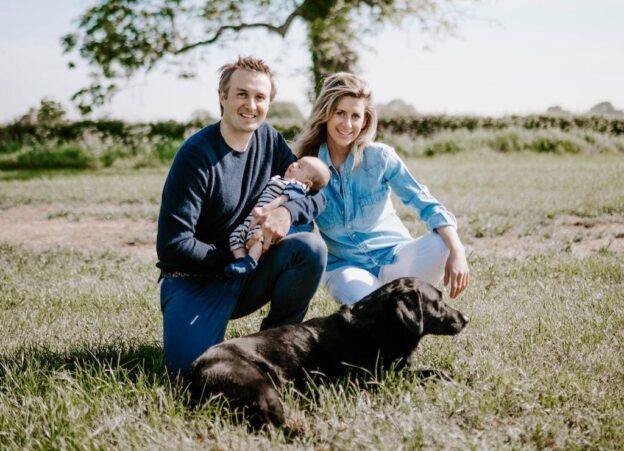Guy, Abi and Ezra Fennell
Pura
Launching a new business during lockdown, with a new baby in the family, might be a step too far for even the determined of entrepreneurs, but it didn’t deter new parents Guy and Abi Fennell.
With their new business Pura, they are on a mission to provide eco-friendly baby care and launched their first product, src00% plastic-free, src00% compostable, and biodegradable baby wipes as the pandemic forced them into lockdown. Made from sustainable plant fibers, the wipes contain no allergens, perfume, or chlorine, with only 99% water and organic aloe vera added.
They came up with the idea for Pura a few years ago, when they had first started thinking about starting a family and began taking notice of the products that their friends with newborns were using, as Guy Fennell explains.
“Abi and I were really shocked by how many plastic-based wipes we saw in friends’ homes,” he says. “I did my own research and discovered that 90% of the wipes currently sold in the U.K. contain plastic, meaning they can last more than src00 years in landfills, yet the vast majority of parents are unaware that the wipes they are using are made from plastic.”
Fennell and his wife decided to take on the big names in the wipes market and set about developing their own range of products. Their determination to drive change was heightened with the arrival of their son, Ezra, in March this year.
At the time, both founders were running other businesses, including wholesale FMCG company Brand Ambassadors International, and clothing retail business Abi Fisher Clothing.
“Starting a new business during lockdown wasn’t ideal, however, we’d spent three years researching and developing our first products and we didn’t want to delay it any longer,” says Fennell.
In the first week after the Father’s Day June 2src launch the website received more than 85,000 hits, with over 22,000 orders placed. Within a month customer orders had doubled, and by August, wipes subscriptions were up by 55% compared with July.
Pura’s products are available both on mail order and subscription selling direct-to-consumer, however, one of the challenges for eco products is often cost; typically, they can be anywhere between 25% and 60% more expensive than mainstream brands.
“Our wipes cost less than three pence per wipe on subscription, offering a price point that is on par, or cheaper than, traditional plastic wipes,” says Fennell. “With free next day delivery on all orders, this model has been critical to the success of the business so far and has also provided a timely solution for parents who stayed at home and avoided the supermarkets during lockdown.”
So far the Fennells have invested £6 million of their own money, secured from their previous businesses. And for all its challenges, lockdown gave the founders’ marketing plans an extra boost. He says: “Lockdown meant that we saved on some of our marketing costs, as a lot of companies had pulled their TV advertising to save costs, so we got a deal we couldn’t refuse.”
The Fennells are now working full time on Pura and already have a team of 2src people working with them to roll out the brand’s ambitious growth plans. Not content with simply promoting their own products, they are now on a mission to ban plastic-based wipes in the U.K. Their launch YouTube video, featuring babies calling on people to ditch plastic wipes, has so far been viewed more than 7 million times.
On the back of consumer demand, there are plans to expand with an extended eco-friendly product range into Europe and beyond. “We’ve just launched our range of nappies—diapers—which are created with src00% green electricity and zero production waste and made with certified natural plant fibers. They contain no nasty chemicals, perfumes, and are approved by Allergy U.K.”
Pura has also partnered with recycling firm NappiCycle to provide a curbside nappy collection and recycling service for 22 local authorities in Wales and is starting discussions with local authorities in England about piloting the scheme to extend this right across the whole of the U.K.
In the last year alone NappiCycle diverted more than 8,000 tons—the equivalent of 40 million nappies—from landfill in Wales. An impressive src00% of the soiled nappies processed by NappiCycle are recycled into useful products like notice boards for schools and offices, paneling, and insulation for affordable housing.
Plastics and plastic packaging have been at the center of the ongoing global environmental challenge, although the main focus in recent years has been on ocean plastics and plastic bottles. While many major organizations have made huge strides in eliminating plastics from their products and processes, consumers are often unaware of their extent in everyday items like wipes.
Fennell, says: “We believe that being eco-friendly is no longer a luxury but a necessity and our ambition is to create products that help families care for their babies now while leaving the right legacy for the future.”

Comments are closed